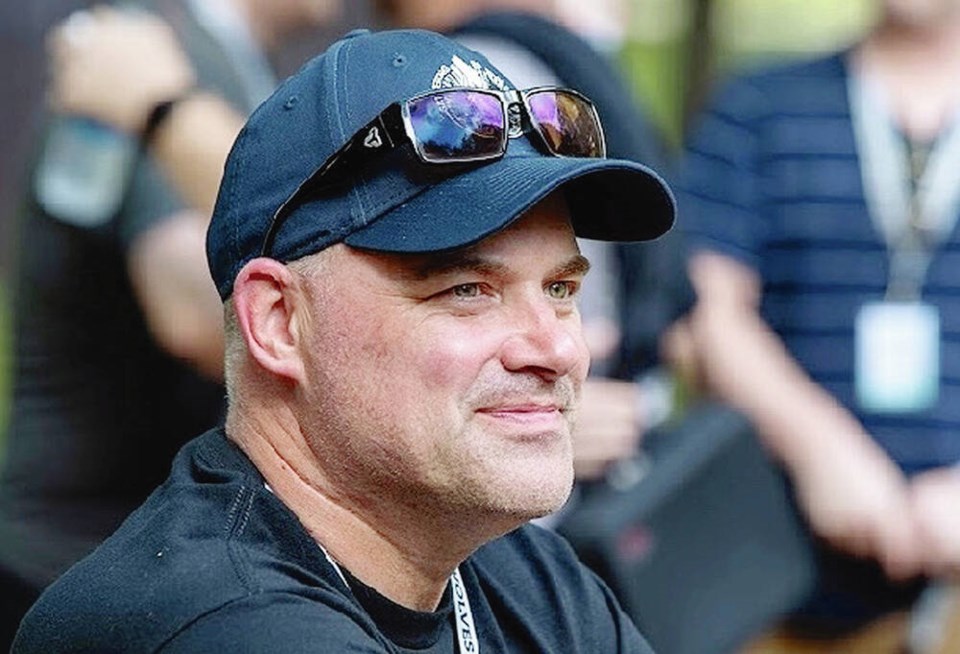When retiring Nanaimo RCMP officer Don Helgeson got on his computer to check his blood-test results, the first thing he searched for was his cholesterol level, the most likely thing to be out of whack for a man his age.
At 51, Helgeson was retiring due to nagging complications from an injury he suffered during an arrest. He figured it was prudent to get a medical check before he lost his full medical benefits package.
“That’s when I saw that I had a PSA reading that was really, really high,” he said. “And I didn’t even know what that meant.”
A prostate-specific antigen test measures the amount of PSA in the blood, primarily to screen for prostate cancer.
He searched online for what a PSA reading of 12.2 could mean. Every search came back with a strong indication for prostate cancer. In December 2020, Helgeson was diagnosed with an aggressive form of prostate cancer.
He opted for radical prostatectomy surgery and his prostate was removed at Nanaimo Regional General Hospital.
Helgeson, now 54, is undergoing more testing and will find out next week if the cancer has returned. Recent bloodwork indicates a rising PSA level that should not be happening if all his cancer was removed in 2020, he said.
“l look back on that now and wonder how did I get to be 51 years old and not have a clue what a PSA reading was or what I could have done to educate myself better,” said Helgeson, adding women generally tend to look after their health better than men.
“I know hindsight is 20/20, but if I had gone maybe a year sooner than I did to get that blood work done, I would not be in the situation I’m in right now.”
As an RCMP officer, Helgeson said, he had an opportunity every 18 months to get full medical exams, but passed on the digital rectal exam, thinking he was too young to worry about that. Like many other men, he was also squeamish about the test.
“I look back at that and wonder: ‘What was I thinking? Why didn’t I get the test done?’ ” said Helgeson, who previously overcame malignant melanoma at age 27 and colon cancer at 37.
Genetic testing determined he had Lynch Syndrome, inherited from his mother, which put him at higher risk for certain cancers at a young age. (His three biological children tested negative for the genetic defect.)
Prostate cancer is a perfect example of a cancer that is easy to detect and successfully treat if caught early, he said.
Since his prostate-cancer diagnosis, Helgeson has been spreading awareness about the disease and support groups.
“I actually wear a T-shirt that says ‘What’s your PSA’ hoping that people will ask me what that means so I can ask them if they’ve checked it lately or why not,” he said.
Helgeson also encourages men, especially in Nanaimo, to look into peer-support groups that he said can be a lifeline in getting through a cancer diagnosis.
“It’s OK to be vulnerable with other men,” said Helgeson. “It’s OK to cry with other men. There is no need to tackle a cancer diagnosis on your own.”
Helgeson is on the leadership team of Man Up To Cancer, a North America-wide support group for men affected by cancer that offers peer support, educational materials and an annual retreat, as well as co-founder of the Vancouver Island-based Sea Wolves Men's Cancer Pack in Nanaimo. He’s also an administrator for PCTribe, a Facebook support group, and has written an online account of his cancer journey at prostatecancer51.com/.
On Monday, Helgeson met with a fellow Man Up group member from San Diego who was in Victoria for the City and Colour concert. “We’re trying to change the way men face cancer and to tell them you don’t have to go through this alone,” he said.
>>> To comment on this article, write a letter to the editor: [email protected]





